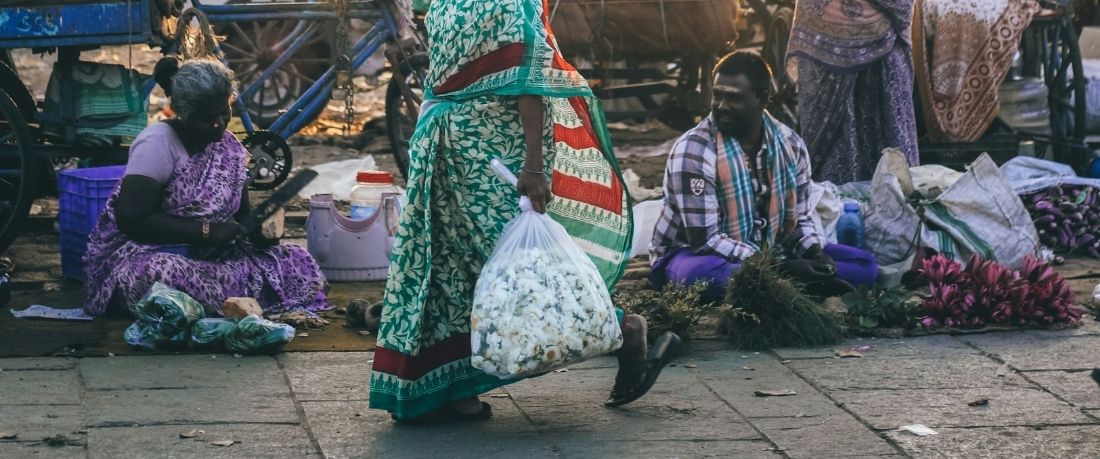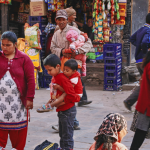This International Women’s Day, join our campaign March4Her, where we share practical information on Sexual and Gender-Based Violence (SGBV) related offences from around South Asia.
The campaign highlights key SGBV issues faced by women and girls in Sri Lanka, Bangladesh, India, Nepal and Pakistan, that are usually accompanied by strong social taboos and stigma. In each of our posts, we provide simple guidance on these topics according to the different jurisdictions and legal frameworks in each country. This article provides further information on each topic and country.
By opening these conversations and offering these resources, iProbono hopes that March4Her will not only assist survivors of violence and discrimination, but serve as a reminder that they are not alone.
Please note that the following information is not a substitute for legal advice and is intended for general awareness only.
SRI LANKA: DOMESTIC VIOLENCE
The definition of domestic violence in Sri Lanka includes any intimate relationship between two individuals who are 18 years or older. It is addressed under the Prevention of Domestic Violence Act of 2005 (PDVA) and recognises two key areas:
- Physical Abuse: Offences against the body already recognized under the Penal Code (This includes Assault, Wrongful Confinement or Restraint)
- Emotional Abuse: A pattern of cruel, inhuman, degrading or humiliating conduct of a serious nature directed towards an aggrieved person
It allows any person facing such violence, or who is likely to face such violence, to seek protection from a magistrate’s court. This court has the authority to issue protection orders, which can be used to ensure the perpetrator is separated from the survivor and their families. A protection order can be valid for anywhere between 14 days to 12 months.
It is important to note that the PDVA does not require the parties to be married.
If you are a survivor of domestic violence, you do not have to tolerate abuse due to the relationship you share. If you face domestic violence, take the following action, if possible:
- Confide in a trusted friend or relative.
- Gather as much evidence as you are able to, including video or audio recordings, screenshots of text or social media messages, and photos of any abuse.
- Seek immediate medical attention. Ask for medical reports each time you visit a hospital.
- In case the abuse is sexual in nature, try to avoid taking a shower and washing your clothes till after a medical examination.
- Try to find a safe place for yourself with family or trusted associates. Or request a safe house from a women’s rights organisation or government-run shelter home. If you have children, try to ensure their safety as well.
- You can ask for a lawyer’s assistance with any part of the process, and they can accompany you to court.
To report the offence:
- File a complaint at the Women and Children’s desk available in all police stations islandwide. You can do this where you live with your partner, or a place you move to for your safety. This police complaint is important evidence to request a protection order under the PDVA from the magistrate’s court. No one, including the police, can discourage you from seeking legal protection.
- Or call the Sri Lanka Police Women and Children’s Investigation Bureau (WCIB) at 109 or +94 11 2 444 444. Calls to these helplines can be used as evidence before a magistrate.
iProbono provides pro bono legal services focusing on women’s rights and gender-based violence in Sri Lanka. Contact Kaveesha Coswatte, Advocacy Officer, Sri Lanka, at kaveesha.coswatte@dev.matsio.com/matsio/oldiprobono for assistance.
BANGLADESH: REVENGE PORN
Revenge porn is a form of digital abuse where sexually explicit photos or videos are shared without the consent of the individuals depicted in them. This is usually done with the intention of extortion or causing distress. The act is often done by former intimate partners like an ex-boyfriend or ex-husband. The offenders may also expose the personal information of the affected person along with explicit material. While Bangladesh does not have any specific law against revenge porn, there are several laws that partially address the issue, such as the Cyber Security Act 2023, Pornography Control Act 2012, Penal Code 1860, Prevention of Oppression Against Women and Children Act 2000, and Children Act 2013.
If you are a survivor of revenge porn, understand that it is not your fault and that you can seek help and support. If you are targeted with the offence of revenge porn, you or someone you know can take the following actions:
- Confide in a trusted friend or relative and ask for their support.
- If the content has been shared through social media platforms or uploaded publicly onto an adult content-sharing platform, you can report the content to the platforms using their community guidelines or similar processes.
- Preserve evidence by saving screenshots and recordings. Do not delete any communication with the perpetrator.
- Document the locations where the content is circulating so that you can assist the authorities in identifying the origin of the content.
- Refrain from engaging with the content. Do not share it with others unless absolutely necessary. Request your friends and family to do the same.
- You can send legal notices through a lawyer to the platforms where the content is shared and ask for it to be removed.
If you are facing revenge porn and seeking protection and justice, follow these steps:
- Report the incident to Police Cyber Support for Women (PCSW). You can contact PCSW through Facebook at www.facebook.com/PCSW.PHQ, via email at cybersupport.women@police.gov.bd or by calling the helpline 01320000888. Someone acting on your behalf can also make the call to complain.
- Visit the local law enforcement office or police station nearest to you and approach the female officer to make a complaint.
- Call the National Police Helpline Number to prevent violence against women and children at 109/10921.
- Call the National Emergency Service at 999 for centralised 24/7 emergency support, that allows any citizen within Bangladesh to connect with the police directly.
- If you feel that the law enforcement office/police are not providing the required support, contact a lawyer or reach out to the District Legal Aid Office to file a complaint before the court.
iProbono provides pro bono legal services focusing on women’s rights and gender-based violence in Bangladesh. Contact Tarek Rahman, Legal Officer, Bangladesh, at tarek.rahman@dev.matsio.com/matsio/oldiprobono for assistance.
NEPAL: MENSTRUAL DISCRIMINATION (CHHAUPADI)
Chhaupadi is a traditional practice prevalent in Nepal’s far and mid-western regions. Women are regarded as ‘impure’ during their menstruation cycle, leading to social isolation in all aspects of daily life and discrimination. Typically, women reside in separate houses or cattle sheds called chhau goths for five days during menstruation and are not allowed to enter residences, kitchens, or shrines. Access to water taps and wells is also restricted.
Many policies have been formulated and implemented that target the eradication of chhaupadi in Nepal. For instance, the 2015 Constitution of Nepal ensures the right to equality (Article 18) and the right to reproductive health (Article 38). Likewise, Article 24 (1) and Article 29 (2) affirm that “no one shall be treated with any kind of untouchability or discrimination and no one shall be exploited based on any custom, tradition, culture, and practices or any other bases”. In May 2005, the Supreme Court outlawed chhaupadi as malpractice and directed the government to make necessary legal arrangements to eliminate it. In 2008, the government of Nepal formulated directives to eliminate the practice. The Criminal Code Act (2017) has criminalised chhaupadi and included the provision of a three-month jail sentence and/or 3,000 Nepalese Rupees (NRs) fine for anyone forcing a woman to follow the custom.
Despite the practice of chhaupadi being a criminal offence under the law, existing societal norms make it difficult for authorities to prosecute those upholding the tradition. Social conditioning of women often makes them complicit in perpetuating this discrimination. The fear of isolation and ostracisation by one’s community also discourages individuals from reporting the offence. If you know anyone who is compelled to practise chhaupadi, and is seeking protection and justice, follow these steps:
- Report to the nearest police station or contact the 24-hour National Helpline for gender-based violence at 1145. If you are unable to call the relevant helpline number, someone acting on your behalf can make the call.
- Confide in a trusted friend or relative and ask for their support.
- Contact a lawyer or reach out to the legal aid authority for support.
iProbono provides pro bono legal services focusing on women’s rights and gender-based violence in Nepal. Contact Bandana Upreti, Program Officer, Nepal, at bandana.upreti@dev.matsio.com/matsio/oldiprobono for assistance.
PAKISTAN: DOMESTIC WORKER RIGHTS
Women domestic workers form the majority of Pakistan’s informal economy, engaged in various household tasks such as child care, elder care, natal and post-natal care, cooking and cleaning. Despite being a major source of employment, domestic work remains largely unregulated and falls outside the purview of most labour laws.
Three out of four provinces lack specific laws safeguarding domestic workers’ rights. However, the 1973 Constitution of Pakistan safeguards the fundamental rights of domestic workers by mandating the state to eradicate all forms of exploitation. The Constitution also prohibits slavery and forced labour. The relevant laws addressing domestic worker rights in Pakistan are the Punjab Domestic Workers Act 2019 and the Islamabad Capital Territory Domestic Workers Act 2022.
If you’re a domestic worker in Punjab or Islamabad experiencing various rights violations like discrimination, forced and child labour, abuse, inadequate wages or safety concerns, you may follow these steps:
- Contact the Dispute Resolution Committees headed by an Assistant Commissioner in your area. If you’re dissatisfied with their decision, you can appeal to the Appellate Authority for a review.
- For child protection concerns, contact these authorities:
- In Punjab, the Child Protection & Welfare Bureau at 042-1121;
- In Sindh, Sindh Child Protection Authority (SCPA) at 021-99333044;
- In Balochistan, the Social Welfare Department’s Child Protection Unit at 081-9201502/081-9203038;
- In Khyber Pakhtunkhwa, the KP Child Protection and Welfare Commission at 091-5244423-24.
- Confide in a trusted friend or relative and ask for their support.
- Gather as much evidence as you can, including video or audio recordings or photos of any abuse.
- If the abuse is sexual in nature, try to avoid taking a shower and washing your clothes till after a medical examination.
- Anyone with pertinent information about violations of a domestic worker’s rights can report it to the relevant authorities.
- You can also contact the nearest legal services authority for free legal aid support.
When contacting or reporting to the above-mentioned relevant authorities, you can request the following:
- Assistance with social welfare programs and counselling services for yourself or your family.
- Investigation and intervention in cases of labour law violations.
- Provision of legal advice, representation, and assistance in resolving legal disputes or addressing issues related to employment rights, contracts, and working conditions.
iProbono provides pro bono legal services focusing on women’s rights and gender-based violence in Pakistan. Contact Danyal Khan, Program Officer, Pakistan, at danyal.khan@dev.matsio.com/matsio/oldiprobono for assistance.
INDIA: SEXUAL VIOLENCE AGAINST WOMEN WITH DISABILITIES
Sexual and Gender-Based Violence (SGBV) against women and children with disabilities in India lacks specific statutory definition, contributing to their marginalization across social, political, and personal spheres. This intersectional vulnerability exposes them to increased risks of SGBV, both within and outside their homes. Notably, many perpetrators of such violence are caregivers within domestic or institutional settings.
While there is no dedicated statute addressing SGBV against women and children with disabilities, laws addressing this include the Indian Penal Code, 1860, Protection of Women from Domestic Violence Act, 2005, the Mental Healthcare Act, 2017, the Protection of Children from Sexual Offences Act, 2012, and the Rights of Persons with Disabilities Act, 2016.
Despite these legal provisions, addressing the unique challenges faced by women and children with disabilities remains a critical aspect of the broader fight against SGBV in India.
If you are a woman or child with disabilities facing SGBV, you may take the following steps:
- Confide in a trusted friend or relative and ask for their support.
- Gather as much evidence as you are able to, including video or audio recordings, screenshots of text or social media messages, and photos of any abuse.
- Seek immediate medical attention. Ask for medical reports each time you visit a hospital.
- If the abuse is sexual in nature, try to avoid taking a shower and washing your clothes till after a medical examination.
- Contact the Women’s Helpline at 181, the Police Helpline at 1091/1291, or the National Commission for Women at 7827170170.
- Try to find a safe place for yourself with the help of your trusted associates. Or request a safe house from a women’s rights organisation or government-run shelter home.
- Report the offence to any police station. A complaint will be lodged and later transferred to the police station nearest to you.
- If you are unable to make a complaint, anyone with information about the abuse and acting on your behalf can make a complaint.
- At the police station, you can request the presence of a woman police officer.
- In case of a child, you can report the offence to a Special Juvenile Police Unit (SJPU). Each police station has details of the SJPU and should direct you to one.
- You can also directly approach the nearest Executive Magistrate.
- Contact a lawyer or the relevant legal aid authority for support.
iProbono provides pro bono legal services focusing on women’s rights and gender-based violence in India. Contact Shrutika Pandey, Program Officer, India, at shrutika.pandey@dev.matsio.com/matsio/oldiprobono for assistance.







